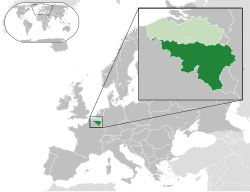Wallonia
|
Walloon Region Région wallonne Wallonische Region |
|||
|---|---|---|---|
| Region of Belgium | |||
|
|||
| Anthem: "Le Chant des Wallons" | |||
 |
|||
 |
|||
| Country | Belgium | ||
| Capital | Namur | ||
| Government | |||
| • Executive | Walloon Government | ||
| • Governing parties (2014–2019) | PS, cdH | ||
| • Minister-President | Paul Magnette (PS) | ||
| • Legislature | Walloon Parliament | ||
| • Speaker | André Antoine (cdH) | ||
| Area | |||
| • Total | 16,844 km2 (6,504 sq mi) | ||
| Population (January 1, 2015) | |||
| • Total | 3,585,214 | ||
| • Density | 210/km2 (550/sq mi) | ||
| Demonym(s) | Walloons | ||
| Demographics | |||
| • Languages | French, German (also Dutch in Municipalities with language facilities) | ||
| ISO 3166 code | BE-WAL | ||
| Celebration Day | 3rd Sunday of September | ||
| Website | www.wallonie.be | ||
Wallonia (French: Wallonie [walɔni], German: Wallonie(n), Dutch: Wallonië [ʋaːˈloːni.ə], Walloon: Walonreye Walloon pronunciation: [walɔ̃ʀɛjɜ]; Luxembourgish: Wallounesch) is a region of Belgium. Wallonia is primarily French-speaking, and accounts for 55% of the territory of Belgium, and a third of its population. Unlike Flanders, the Walloon Region was not merged with the French Community of Belgium which is the political entity that is responsible for matters related mainly to culture and education. The German-speaking minority in the east forms the German-speaking Community of Belgium, which has its own government and parliament for culture-related issues.
During the industrial revolution, Wallonia was second only to the United Kingdom in industrialization, capitalizing on its extensive deposits of coal and iron. This brought the region wealth, and, from the beginning of the 19th to the middle of the 20th century, Wallonia was the more prosperous half of Belgium. Since World War II the importance of heavy industry has greatly diminished, and the Flemish Region surpassed Wallonia in wealth as Wallonia declined economically. Wallonia now suffers from high unemployment and has a significantly lower GDP per capita than Flanders. The economic inequalities and linguistic divide between the two are major sources of political conflict in Belgium and is a major factor in Flemish separatism.
...
Wikipedia


